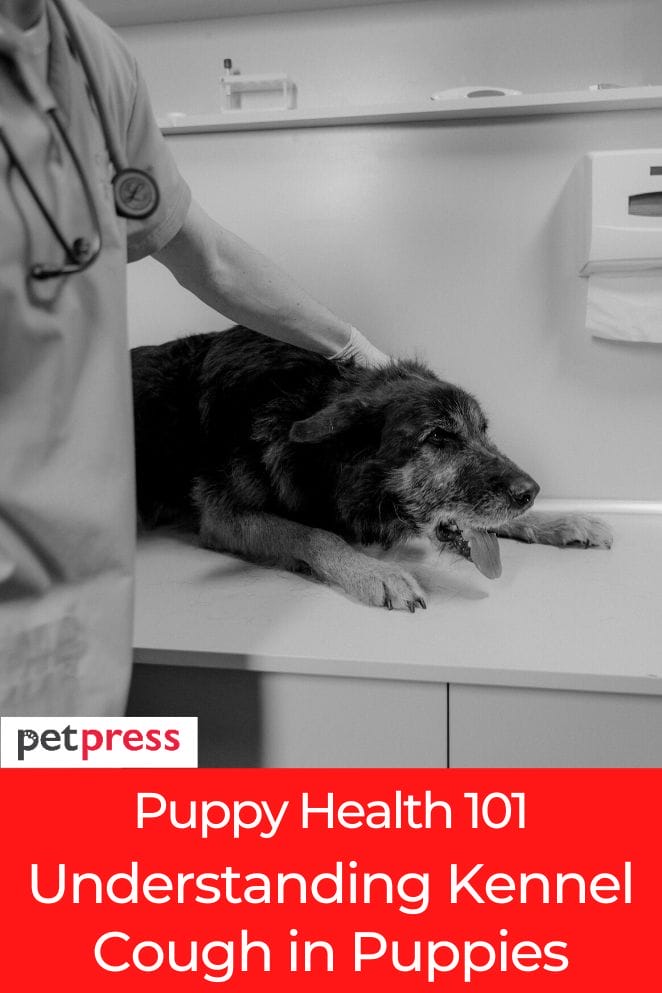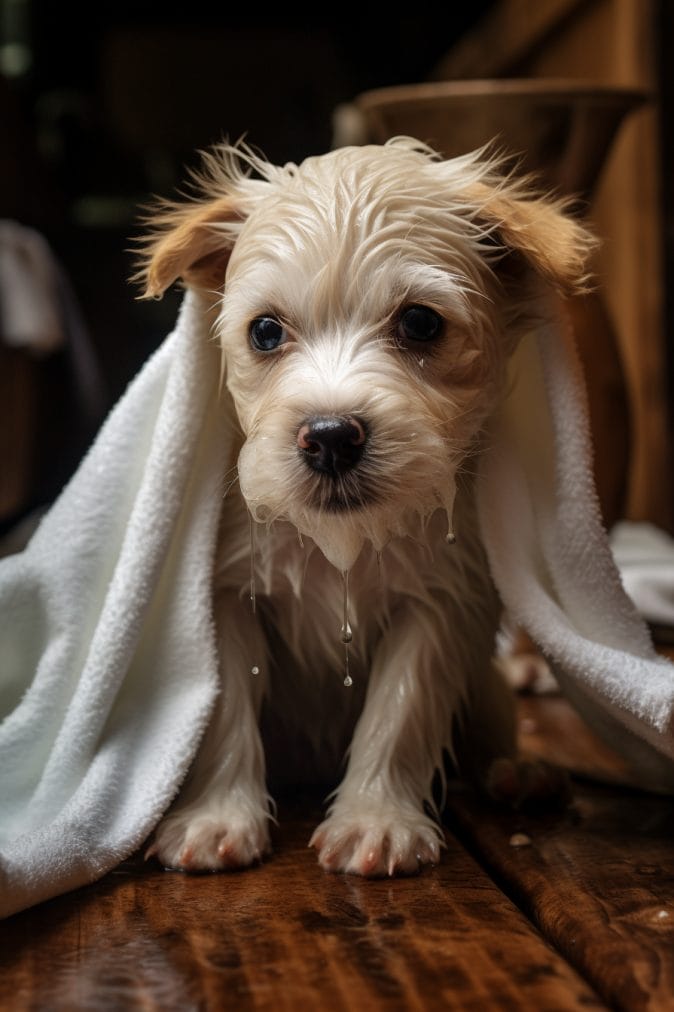
Kennel cough is a highly contagious respiratory disease that affects dogs of all ages, including puppies.
It is caused by a combination of viruses and bacteria, including Bordetella bronchiseptica.
Kennel cough is characterized by a dry, hacking cough that can last for several weeks.
While it is not usually life-threatening, it can be uncomfortable for your puppy and may lead to complications if left untreated.
What Is Kennel Cough?
Kennel cough is a contagious respiratory infection that primarily affects the trachea and bronchi in dogs.
It spreads rapidly in places where dogs gather, such as kennels, dog parks, and grooming facilities.
The predominant symptom is a dry, hacking cough, often triggered by excitement, exercise, or pressure on the trachea.
Additional signs may include sneezing, a runny nose, and eye discharge.
This condition poses a heightened risk in environments with close canine proximity.

How Puppies Catch Kennel Cough
Puppies are more susceptible to kennel cough, and there are various factors contributing to their increased vulnerability:
Underdeveloped immune systems
Puppies have less mature immune systems compared to adult dogs.
This developmental stage makes them more prone to infections, including kennel cough.
Unlike fully developed immune defenses in adult dogs, the incomplete maturation in puppies leaves them less equipped to fend off such respiratory infections.
Transmission from infected dogs
Kennel cough is easily transmitted through direct contact with infected dogs.
Puppies can catch the infection during playdates, walks, or in shared spaces.
Additionally, the contagion can persist on surfaces like food and water bowls, toys, and bedding, acting as potential sources of transmission.
This heightened risk emphasizes the importance of monitoring interactions and maintaining a clean environment.
Environmental factors
Puppies regularly exposed to other dogs, particularly in places like kennels or shelters, face an elevated risk of contracting kennel cough.
The close proximity and shared spaces in communal environments create ideal conditions for the rapid spread of the infection.
This underscores the need for preventive measures, including vaccination and thorough sanitation, to minimize the risk of kennel cough in susceptible puppies.
How Serious Is Kennel Cough in Puppies?
Kennel cough is generally not a life-threatening condition, but it can pose a serious threat to puppies, particularly those with weakened immune systems.
While the infection itself may not be severe, untreated cases in puppies can potentially progress to pneumonia, a more critical and life-threatening complication.
Monitoring your puppy’s symptoms is crucial, and prompt veterinary care is essential if kennel cough is suspected.
Timely intervention can help prevent the progression of the illness to more severe respiratory issues.

Symptoms of Kennel Cough in Puppies
In puppies, kennel cough manifests with a distinctive set of symptoms.
The primary indicator is a dry, hacking cough, often prompted by excitement, exercise, or pressure on the trachea.
Alongside the cough, additional symptoms may manifest, such as sneezing, a runny nose, and discharge from the eyes.
In more severe cases, puppies may exhibit signs of illness like fever, loss of appetite, and increased lethargy.
It’s essential for puppy owners to be attentive to these symptoms, as early recognition and intervention can contribute to a smoother recovery.
If you observe any concerning signs, seeking veterinary advice promptly is recommended to ensure the best care for your puppy.
How to Treat Kennel Cough in Puppies
Treating kennel cough in puppies involves a tailored approach based on the severity of the symptoms.
Understanding the available treatment options and diligently following your veterinarian’s guidance is crucial for the effective recovery of your furry companion.
Mild cases
In cases of mild kennel cough symptoms, veterinarians often advise a regimen focused on rest and supportive care.
Rest allows the puppy’s immune system to effectively combat the infection, while supportive measures may include using humidifiers to ease respiratory discomfort and administering cough suppressants to alleviate symptoms.
Severe cases
For more severe instances of kennel cough, antibiotics may be prescribed.
These medications target potential secondary bacterial infections that can arise due to the weakened state of the respiratory system.
Completing the full course of antibiotics is crucial, even if the puppy’s symptoms improve, to ensure the complete elimination of the infection and reduce the risk of recurrence.
Veterinarian’s guidance
Following the veterinarian’s instructions is paramount for successful treatment.
Specific guidance on medication dosage, frequency, and additional supportive measures will be provided.
Regular check-ups may be recommended to monitor the puppy’s progress and make adjustments to the treatment plan if necessary.
Home environment
Creating a comfortable and stress-free home environment is essential during the recovery period.
Providing a quiet and warm space for rest, ensuring easy access to clean water for adequate hydration, and minimizing exposure to potential stressors contribute to the puppy’s well-being.
Isolation
If a puppy is diagnosed with kennel cough, it’s advisable to isolate them from other dogs to prevent further spread of the infection.
Additionally, minimizing exposure to stressors is important, as stress can exacerbate symptoms.
Vaccination
Prevention plays a crucial role in managing kennel cough.
Discuss vaccination options with your veterinarian to protect your puppy from future occurrences.
Keeping up with the recommended vaccination schedule helps maintain immunity against kennel cough and other respiratory infections.

Prevention of Puppy Kennel Cough
Preventing kennel cough in puppies involves minimizing their exposure to infected dogs and contaminated surfaces. Here are some tips to prevent kennel cough in puppies:
- Avoid taking your puppy to places where dogs congregate, such as kennels, dog parks, and grooming facilities.
- Keep your puppy away from sick dogs.
- Wash your hands and change your clothes after handling other dogs.
- Clean and disinfect your puppy’s toys, bedding, and food and water bowls regularly.
- Vaccinate your puppy against kennel cough.
Kennel Cough Puppy Vaccine
The kennel cough puppy vaccine is a comprehensive immunization combining various vaccines designed to safeguard against the primary causes of kennel cough, with a specific focus on Bordetella bronchiseptica.
This vaccine is particularly recommended for puppies regularly in contact with other dogs, such as those residing in kennels or shelters.
Adhering to your veterinarian’s vaccination schedule is crucial to ensure your puppy receives complete protection.
Conclusion
Kennel cough is a prevalent respiratory infection that can impact puppies and dogs of all ages.
Although it typically isn’t life-threatening, it can cause discomfort for your puppy and may lead to complications if not addressed promptly.
To ensure the well-being of your furry companion, consider following these prevention tips and vaccinating your puppy against kennel cough.
This proactive approach goes a long way in maintaining your pet’s health and happiness.
Regular veterinary check-ups and adherence to recommended vaccination schedules are key steps in safeguarding your puppy from this common respiratory ailment.
FAQs
No, kennel cough is not contagious to humans.
The recovery time for kennel cough in puppies depends on the severity of the symptoms. Mild cases may resolve within a week, while more severe cases may take several weeks to recover.
Yes, vaccinated puppies can still contract kennel cough, as the vaccine does not cover every strain of the virus and bacteria that cause kennel cough.
Kennel cough is preventable by minimizing your puppy’s exposure to infected dogs and contaminated surfaces and vaccinating your puppy against kennel cough.
- Does Cat Litter Melt Ice? The Complete Guide to Winter Safety - January 30, 2026
- Happy Tail Dogs: Understanding This Common Canine Condition - January 29, 2026
- How Cold Can Outdoor Cats Handle? Feline Winter Safety - January 27, 2026


GIPHY App Key not set. Please check settings